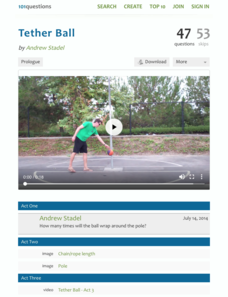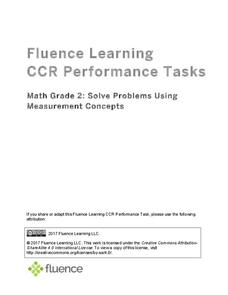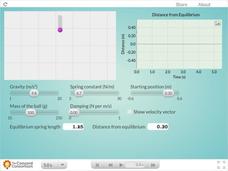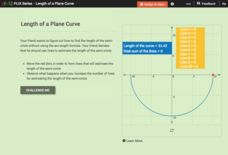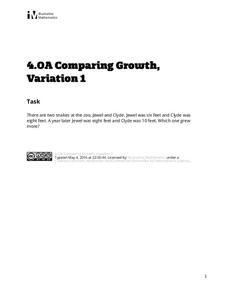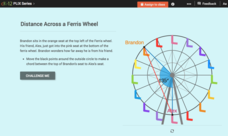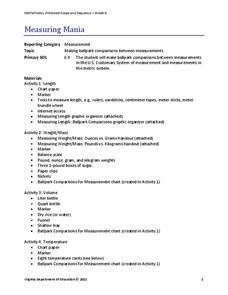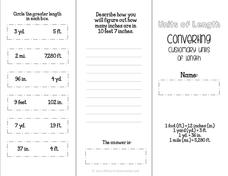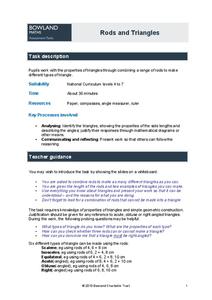Concord Consortium
Square-Ness
Are there some rectangles that are more square than others? A thought-provoking task asks individuals to create a formula that objectifies the square-ness of a set of rectangles. They then use their formulas to rank a set of rectangles.
101 Questions
Brita
It's hard to envision what 39 billion plastic bottles look like. Brita claims that the US uses that number of plastic bottles each year! If that's not enough to get your attention, figure out how many times 39 billion water bottles can...
101 Questions
Tether Ball
All work and no play makes for a boring classroom! Bring back memories by analyzing the patterns of a tether ball. Given the dimensions of the ball, pole, and rope, young scholars must determine how many times the ball will wrap around...
101 Questions
Binder Clips: Large, Medium, Small
Ever wondered how many pieces of paper a binder clip can hold? Viewers of a short video are about to find out! Given measurement data for three different sized binder clips, learners must develop a method for figuring out how many pieces...
Physics Classroom
Name That Harmonic: Closed-End air Columns
Physics is like music—practice makes perfect! Challenge your class using an interactive that builds harmonic skills. The engaging lesson from a playlist exploring sounds and waves revolves around wave behavior in closed-end air columns....
Physics Classroom
Name That Harmonic: Strings
Don't string your class along! Physics scholars discover the fascinating forces behind the music of stringed instruments using an interactive. From a series covering sounds and waves, the interactive asks users to identify nodes and...
Fluence Learning
Solve Problems Using Measurement Concepts
Young mathematicians demonstrate what they know about measurement with a four-task assessment that focuses on estimation, length, and inches.
Concord Consortium
Double Pendulum
What's better than a pendulum for studying motion and periods? A double pendulum! Young physical scientists use an interactive to explore pendulum motion—times two. The resource boasts a host of parameters to change and a running graph...
Concord Consortium
Spring and Mass
Here's a resource with more bounce for the ounce! Engage your physical science class with an interesting interactive that allows individuals to perform tests with a mass attached to a spring. Participants can customize the scenario by...
Concord Consortium
Pendulum
Add some zing to your swing! Explore pendulum motion through an engaging interactive. Physical science scholars specify the pendulum's mass, rod length, and starting angle before they observe the resulting angle graph.
CK-12 Foundation
Length of a Plane Curve
Challenge your class to use straight lines when estimating the length of a curve. An engaging interactive allows individuals to place line segments one after another along the arc. Learners determine that the more lines used, the better...
Concord Consortium
Pendulum and Spring
Up, down, back, and forth. When you make a pendulum out of a spring, there's a lot to observe. Aspiring masters of motion examine the combined kinetic energies of spring and pendulum motion using a detailed interactive. Learners observe...
Illustrative Mathematics
Comparing Growth, Variation 1
Young mathematicians compare the growth of two snake lengths in feet over one year in a straightforward word-problem task.
CK-12 Foundation
Length of a Chord: Distance Across a Ferris Wheel
An interactive presents two friends on a ferris wheel with the task of finding the distance between the them. Pupils create the chord between the two friends and calculate its lengths using trigonometric ratios.
Virginia Department of Education
Measuring Mania
Conversion immersion — it's measuring mania! A set of four activities teaches scholars to convert between customary and metric units. Resource covers unit conversions in length, temperature, weight/mass, and volume.
CK-12 Foundation
Pythagorean Theorem to Determine Distance: Tree Shadows
Why is that shadow getting longer? Determine the changes in the length of a shadow as the sun changes position in the sky. Individuals use an interactive to calculate the length of a shadow at different times during the day via the...
EngageNY
Distance on the Coordinate Plane
Scholars learn how to find the distance of vertical and horizontal line segments on the coordinate plane in the 19th installment of a 21-part module. The use of absolute value comes in handy.
Teach Engineering
Discovering Relationships Between Side Length and Area
Consider the relationship between side length and area as an input-output function. Scholars create input-output tables for the area of squares to determine an equation in the first installment of a three-part unit. Ditto for the area of...
EngageNY
Computing Actual Lengths from a Scale Drawing
The original drawing is eight units — how big is the scale drawing? Classmates determine the scale percent between a scale drawing and an object to calculate the length of a portion of the object. They use the percent equation to find...
Curriculum Corner
Converting Customary Units of Length Brochure
Customary units, also known as standard units of measurement, are the focus of a conversion brochure. Learners compare, identify, and convert customary units of length before folding the sheets into a brochure.
Balanced Assessment
Fermi Length
How long does it take to get to the end of a toilet paper roll? Pupils use their estimation strategies to find lengths of common items. For example, knowing the area of a roll of toilet paper, scholars determine the length of the full roll.
Bowland
Rods and Triangles
Scholars explore triangles with rods of different lengths. Using rods of 2, 4, 6, 8, and 10 cm class members build as many different types of triangles as they can. They also describe properties of these triangles and determine...
Bowland
Highway Link Design
Discover a renewed appreciation for the highway transportation department. with a lesson that has scholars design a highway route that meets certain conditions, including traffic flow, curves, speed limits, financial costs, and...
Teach Engineering
What is a Nanometer?
Teams learn about the size of a nanometer by measuring objects and converting those measurements. A worksheet then tests the groups' abilities to use nanometers by having them determine the size of objects that are too small to measure.




